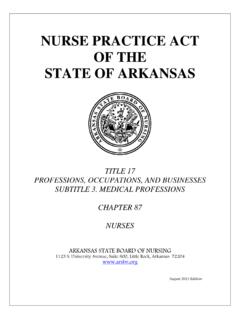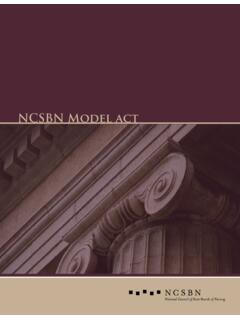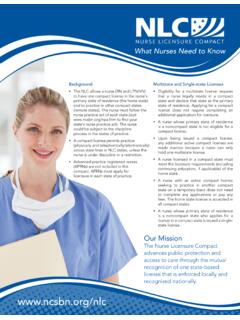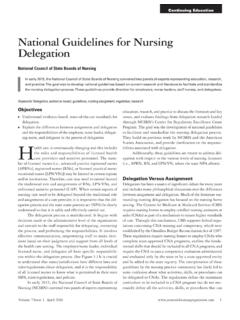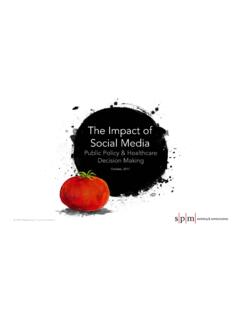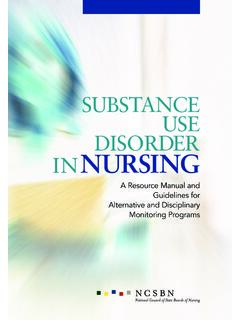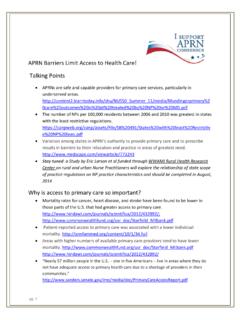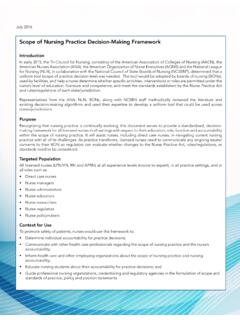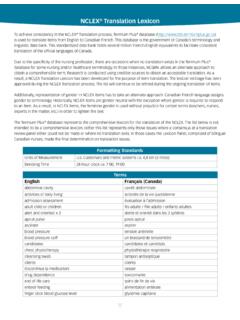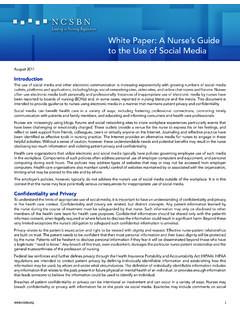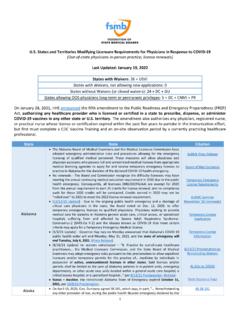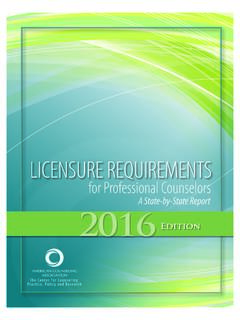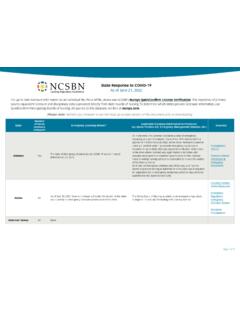Transcription of Nursing Licensure - National Council of State Boards of ...
1 What You Need to Know About Nursing Licensure and Boards of NursingA license issued by a governmental entity provides assurance to the public that the nurse has met predetermined You Need to Know About Nursing Licensure and Boards of Nursing any professions in the , such as school teachers, attorneys, physicians, pilots and nurses, require a license as a condition of practicing a chosen occupation. Nurses, with more than million individuals holding Licensure at this time, are the second largest group of licensed professionals in the purpose of a professional license is to protect the public from harm by setting minimal qualifications and competencies for safe entry-level practitioners.
2 Nursing is regulated because it is one of the health professions that poses a risk of harm to the public if practiced by someone who is unprepared and/or general public may not have sufficient information and experience to identify an unqualified health care provider, and is vulnerable to unsafe and incompetent practitioners. A license issued by a governmental entity ( , the State board of Nursing [BON]) provides assurance to the public that the nurse has met predetermined benefits both the public and the individual nurse because essential qualifications for Nursing practice are identified; a determination is made as to whether or not an individual meets those qualifications; and an objective forum is provided for review of concerns regarding a nurse s practice when needed.
3 Licensure benefits nurses because clear legal authorization for the scope of practice of the profession is established. Licensure also protects the use of titles. Only a licensed nurse is authorized to use certain titles ( , registered nurses [RNs], licensed practical/vocational nurses [LPN/VNs], advanced practice registered nurses [APRNs], etc.) or to represent themself as a licensed More than 100 years ago, BONs were established to protect the public s health by overseeing and assuring the safe practice of Nursing . BONs in states and territories were created to protect the public from the unsafe, incompetent or unethical practice of Nursing .
4 BONs achieve this mission by establishing the standards for safe Nursing care and issuing licenses to practice Nursing . Once a license is issued, the BON holds licensees to provisions defined in State /territorial laws and when necessary, takes action against the licenses of those nurses who have exhibited unsafe Nursing BONs in the 50 states , the District of Columbia, and four territories Guam, Virgin Islands, American Samoa, and the Northern Mariana Islands comprise the membership of the National Council of State Boards of Nursing , Inc. (NCSBN ). Four states have two BONs, one for RNs and one for LPN/VNs: California, Georgia, Louisiana and West Virginia.
5 One State , Nebraska, has a separate board for BONs are responsible for:Evaluating Licensure ApplicationsBONs review the information submitted in applications for initial licenses from new graduates of Nursing programs or internationally educated nurses, and endorsement from nurses licensed in other LicensesBONs base Licensure decisions, for both initial Licensure and Licensure by endorsement, on whether or not applicants meet all the requirements for Licensure as set forth in individual State statutes and LicensesBONs establish procedures for nurses to apply for periodic renewal of their licenses. Some states require demonstration of continuing education, practice hours or other activities as part of the renewal Disciplinary ActionThrough a disciplinary process, BONs may take action against the licenses of individuals who violate laws or rules.
6 Disciplinary actions taken by BONs may include reprimand, probation, limited or restricted practice, suspended practice and license revocation. Grounds for discipline focus on behaviors that place the public at risk of harm. Statutory language differs from jurisdiction to jurisdiction, but grounds typically include unprofessional conduct, incompetent practice, unethical practice and criminal disciplinary process allows a nurse the opportunity to provide information to the BON regarding his/her perception of the reported allegations. Nurses may choose to be represented by legal counsel. The proce-dures used in discipline cases range from informal proceedings to full administrative hearings and FunctionsBONs may be responsible for authorizing the use of licensing examinations; advising on the determination of the legal scope of Nursing practice in a State ; approving Nursing education programs by determining whether established criteria are met; regulating advanced Nursing practice.
7 And regulating nurse aides/ Nursing assistants and medication aides/assistants working in Nursing home and home health care Nurse Practice Act (NPA) State /territorial legislatures enact NPAs that define how Nursing is regulated in their jurisdiction. The NPA sets forth the requirements for Licensure and defines the scope of Nursing practice. BONs implement the NPA by establishing administrative rules that further define the qualifications for Licensure , define the scope of practice and limit the use of titles. Each jurisdiction has the authority for the legal regulation of Nursing . Legislatures enact the NPA for a jurisdiction.
8 An NPA typically: Defines the authority of the BON, its composition and powers; Defines Nursing and the boundaries of the scope of Nursing practice; Identifies types of licenses and titles; states the requirements for Licensure ; Establishes educational program standards; Protects titles; and Determines the grounds for disciplinary action, other violations and possible NPA may also identify situations when Licensure is not required ( , in cases of an emergency).BON Administrative Rules/RegulationsOne of the most important authorities granted to BONs is the ability to develop administrative rules that are used to clarify or make statutes more specific.
9 Rules/regulations must be consistent with the NPA, cannot go beyond the law and once enacted, have the force and effect of law. The process of public review of these rules (promulgation) includes opportunity for comment. Nurses and Nursing students who may be affected if rules are implemented or who are interested in the issues presented may wish to contribute to the rule-making process by submitting written comments or by participating in rule-making NPA sets forth the requirements for Licensure and defines the scope of Nursing Individual NurseAn individual who wishes to practice Nursing is responsible for obtaining and maintaining Nursing Licensure , and obeying Licensure laws.
10 To be able to legally practice Nursing requires current licensed nurse is responsible and accountable for practicing Nursing within a legally defined scope of Nursing practice based upon the parameters set forth in law and rules, and consistent with his/her own education, knowledge, skills and FAQsWhy do nurses need a license? Nursing is one of the health professions that can cause harm to the public if practiced by someone who is unprepared and/or incompetent. The public may not have sufficient information and experience to identify an unqualified health care provider, and is vulnerable to unsafe and incompetent practitioners.
